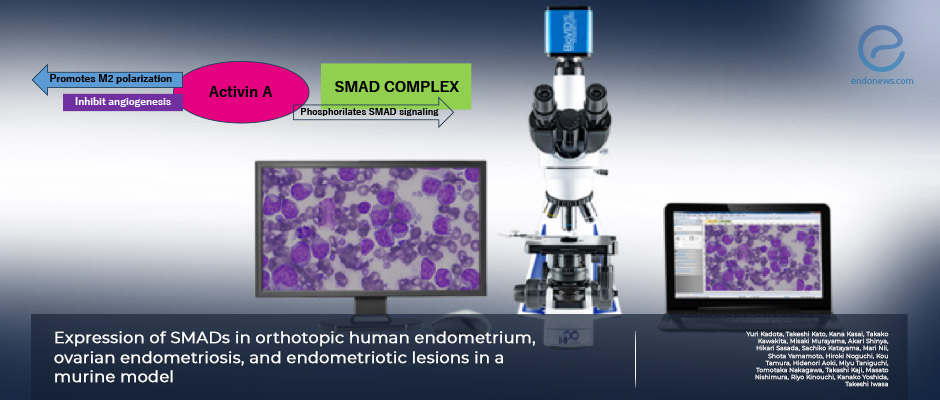Sophisticated study yields hopes for a new potential remedy
May 9, 2024
Unique study reveals potential therapeutic property of SMAD7 molecule for endometriosis
Key Points
Highlights
- Higher concentrations of activin are detected in the peritoneal fluid and serum in women with endometriosis when compared to women without endometriosis.
- Intraperitoneal administration of activin promotes the development of endometriotic lesions in laboratory mice.
Importance:
- The role of activin in the pathogenesis and progression of endometriotic foci utilizing the “suppressor of mothers against decapentaplegic” (SMAD) signaling pathway should be examined.
What's done here:
- The authors have investigated the expression of pSMAD3 or pSMAD2/3 and SMAD7 in orthotopic human endometria, ovarian endometriosis, and endometriotic foci in laboratory mice.
- The effect of activin A on the expression of pSMAD2/3 and SMAD7 was also evaluated.
Main key feature :
- Activin A activates the SMAD signaling pathway promoting the development of endometriotic foci.
- SMAD7 stands out as a potential therapeutic target for endometriosis.
Lay Summary
Academicians from the Institute of Biomedical Sciences, Tokushima University Graduate School, Japan, conducted a clinical and experimental study on the role of SMAD (Suppressor of Mothers Against Decapentaplegic) molecules in endometriosis, and have published their results in a recent issue of Endocrine Journal.
Activin is known to enhance the development of endometriotic lesions in laboratory mice. Also, a suppressor of mothers against decapentaplegic homolog 2/3 (pSAMA2/3) molecule in endometriotic lesions by immunostaining has been reported. Activin may therefore be involved in the development process, as well as the proliferation of endometriotic cells via the SMAD signaling pathway.
The expression of pSMAD2/3 or pSMAD3 and SMAD7 were assessed in the orthotopic human endometrium, ovarian endometriosis, and endometriotic foci in laboratory mice, and the effect of activin A on pSMAD2/3 and SMAD7 expression was evaluated. Furthermore, ovarian endometriosis and uterine endometrium samples were obtained from 10 patients whereas normal uterine endometrium tissues were taken from five patients without endometriosis who underwent total hysterectomy.
An endometriosis murine model via the intraperitoneal administration of endometrial tissue and blood from donor mice was established. ActivinA was intraperitoneally administered to the activin group of 8 animals. The recipient mice were euthanized 5 days after the surgical procedure. Finally, orthotopic endometria, ovarian endometriotic tissues, and endometriotic lesions in the murine model were evaluated. All mice in the activin group had abdominal endometriotic foci whereas the 6/8 animals in the control group still had endometriosis lesions.
pSMAD3 and SMAD7 were expressed in ovarian endometriosis and orthotopic endometria from patients with and without endometriosis, whereas endometriotic lesions of the laboratory mice showed pSMAD2/3 and SMAD7 in the activin and control groups, plus higher SMAD7 expressions in the activin group.
The findings suggest that Activin A promotes the development of endometriosis by activating the SMAD signaling pathway. The authors suggest that their findings point to the potential therapeutic implication of SMAD7 on for endometriotic tissues.
Research Source: https://pubmed.ncbi.nlm.nih.gov/38417880/
immunohistochemistry murine endometriosis activin suppressor of mothers against decapentaplegic (SMAD)

